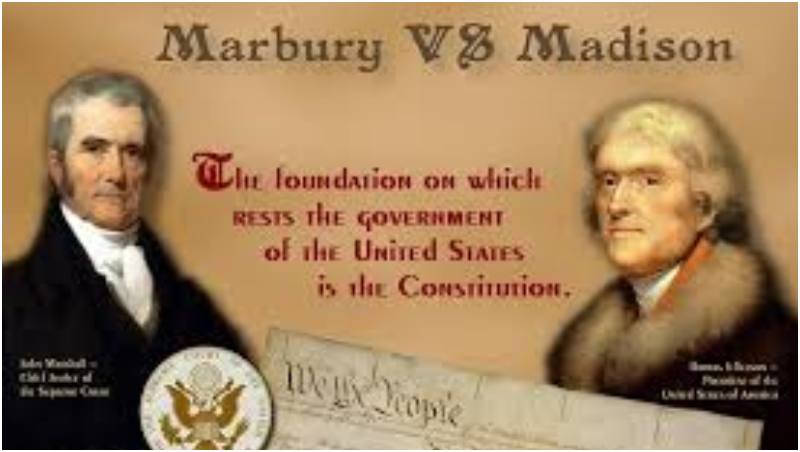In 1803, a landmark U.S. Supreme Court case, Marbury v. Madison, established a crucial principle of American constitutional law: the power of judicial review.
This case continues to shape the workings of the U.S. legal system today. To understand its importance, we must first look at the events that led up to the case, the ruling itself, and its long-lasting effects on the balance of power within the U.S. government.
Background: The Appointment of William Marbury
In the waning days of President John Adams’ administration, the U.S. government underwent significant changes. As part of his effort to secure Federalist influence in the country, Adams signed a series of judicial appointments to create new courts. One such appointment was that of William Marbury, who was designated as Justice of the Peace for the District of Columbia. However, by the time Adams left office in 1801, Thomas Jefferson had become president, and Jefferson’s Secretary of State, James Madison, refused to honor the appointments, including Marbury’s.
Madison’s refusal to deliver Marbury’s commission as Justice of the Peace left Marbury without a legal right to assume his new position. Marbury, frustrated by the situation, took legal action and petitioned for a writ of mandamus—a court order demanding that Madison fulfill his constitutional duty and deliver the commission.
The Supreme Court’s Ruling
The case was brought before the U.S. Supreme Court, where the justices, led by Chief Justice John Marshall, made a landmark decision. The Court ruled unanimously in favor of Marbury, acknowledging that Madison’s refusal to deliver the commission was, indeed, illegal. In doing so, the Court confirmed that Marbury had a right to the commission he had been appointed to, as it had been legally signed and sealed by the outgoing president.
However, the ruling went much further. The justices also declared that the section of the Judiciary Act of 1789 under which Marbury had sued was unconstitutional. The Court concluded that the law exceeded the power granted to Congress by the Constitution because it attempted to extend the jurisdiction of the Court beyond the scope defined by the Constitution.
Judicial Review: A Game-Changing Precedent
The most significant and enduring impact of the Marbury v. Madison decision was the establishment of judicial review—the principle that the U.S. Supreme Court had the power to determine the constitutionality of laws and executive actions. Chief Justice Marshall’s ruling stated that it was “emphatically the province and duty of the judicial department to say what the law is.” This gave the judiciary the power to review acts of Congress, the President, and the states, ensuring that any laws or executive actions inconsistent with the Constitution could be overturned.
Before this case, the idea of judicial review was a subject of debate, and the notion that courts had the power to invalidate laws was not firmly established. Marbury v. Madison set a powerful legal precedent by affirming this judicial authority, making it a cornerstone of American constitutional law.
The Legacy of Marbury v. Madison
The ruling in Marbury v. Madison forever altered the relationship between the three branches of government. It confirmed the judicial branch’s role as a co-equal branch of government with the power to check the actions of the executive and legislative branches. Judicial review has since been used in numerous cases to invalidate laws and actions that are deemed unconstitutional, shaping the course of U.S. history and protecting citizens’ rights against overreach.
The decision also reinforced the separation of powers and the system of checks and balances, ensuring that no branch of government could act beyond its constitutional authority. Without Marbury v. Madison, the system of judicial review might not have developed in the way that we understand it today.
Conclusion
Marbury v. Madison is one of the most important cases in the history of the U.S. legal system. By asserting the power of judicial review, the Supreme Court effectively cemented its role in interpreting the Constitution and overseeing the actions of the other branches of government. This case not only clarified the judiciary’s role but also provided a framework for future legal decisions that would shape the rights of Americans for generations to come.
The legacy of Marbury v. Madison serves as a reminder of the judiciary’s critical role in maintaining constitutional integrity, and it continues to influence the workings of the U.S. legal system today.

